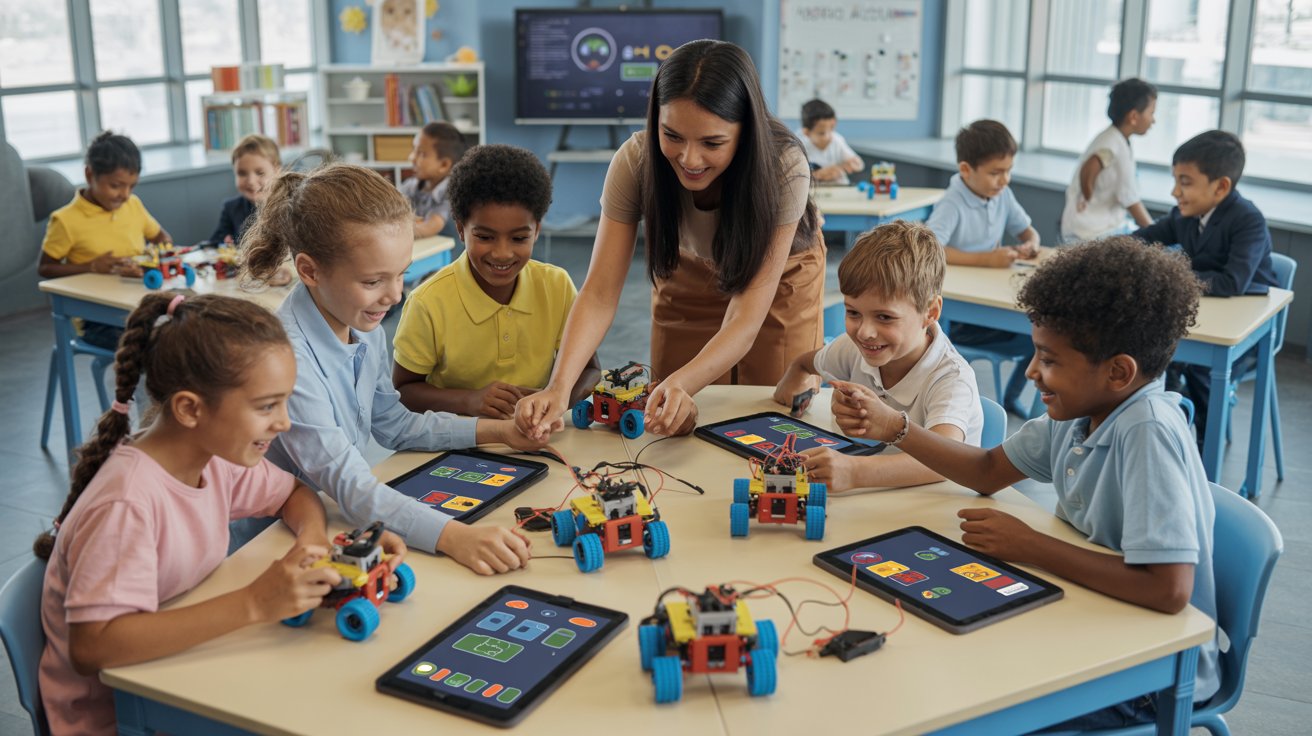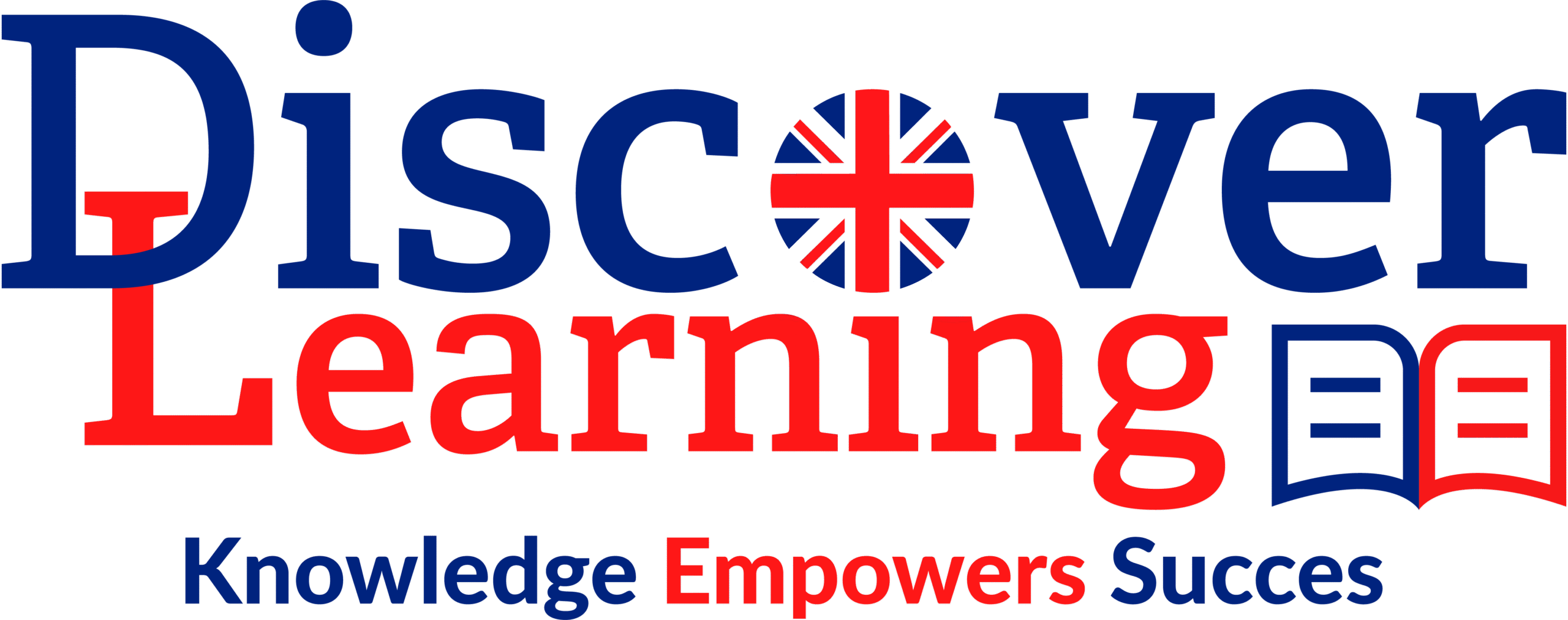
In today’s rapidly evolving digital world, understanding artificial intelligence (AI) is no longer optional—it’s essential. AI is transforming every aspect of our lives, from smart assistants and personalized learning to healthcare innovations and robotics. Preparing the next generation for this reality starts with equipping children with AI literacy from an early age. In Dubai, where innovation and technology-driven education are priorities, introducing AI concepts in primary school is crucial for fostering computational thinking, problem-solving skills, and responsible digital citizenship.
The UAE’s National Strategy for Artificial Intelligence emphasizes integrating AI into education to develop a future-ready workforce. Studies, including Yim & Su (2024), highlight that early exposure to AI tools significantly boosts digital competencies and analytical thinking. At Discover Learning Tutors, we specialize in providing curriculum-aligned AI programs for children aged 6–12, combining interactive, hands-on activities with expert guidance from KHDA-approved educators.
By introducing AI literacy at the primary level, students not only acquire coding and reasoning skills but also develop curiosity, creativity, and ethical awareness about data and automation. From Scratch and PopBots to Teachable Machine and LearningML, age-appropriate tools make AI engaging and accessible. In this guide, we explore why AI literacy should start in primary schools in Dubai, practical strategies for educators, and how Discover Learning Tutors empowers children for a technology-driven future.
The Importance of Early AI Education
Introducing AI concepts in primary school lays the foundation for lifelong digital skills. Young learners are naturally curious, making it the perfect stage to introduce AI fundamentals like pattern recognition, logic, and supervised learning. Early AI exposure also promotes critical thinking and problem-solving abilities, essential for success in STEM subjects and beyond.
1. Building Computational Thinking
Computational thinking is the ability to break down complex problems into manageable steps. By integrating AI activities into primary classrooms, students learn to analyze patterns, make logical decisions, and create simple algorithms. Tools like Scratch and PopBots encourage playful experimentation, fostering logical reasoning while keeping learning enjoyable.
2. Fostering Digital Confidence
AI literacy equips children with confidence in using technology responsibly. Early exposure reduces anxiety around coding and technical subjects while increasing engagement with STEM. Programs offered by Discover Learning Tutors provide structured yet playful experiences that make AI approachable, helping students feel empowered and curious about technological innovations.
Key AI Tools for Young Learners
Selecting the right AI tools is vital for effective early education. Age-appropriate platforms make abstract AI concepts tangible, interactive, and fun.
1. Scratch and PopBots
Scratch, a block-based coding platform, teaches logic and algorithmic thinking without requiring text-based coding. PopBots combines storytelling with robotics, helping students aged 4–7 explore basic AI concepts through engaging play. These tools build foundational coding skills while encouraging creativity.
2. Teachable Machine and LearningML
Google’s Teachable Machine allows students to create image and audio classification models via drag-and-drop, simplifying machine learning principles. LearningML offers a visual interface for building AI models, introducing concepts like classification and supervised learning. Discover Learning Tutors integrates these tools into their AI sessions, ensuring students learn through hands-on experimentation while staying aligned with Dubai’s curriculum standards.
Pedagogical Strategies for AI Literacy
Effective AI education requires thoughtful teaching strategies that cater to young learners’ developmental needs.
1. Project-Based Learning
Project-based learning allows students to apply AI concepts to real-world scenarios. Children might create simple predictive models or build AI-driven simulations, enhancing engagement and reinforcing problem-solving skills. This hands-on approach promotes collaboration and critical thinking.
2. Play-Based and Human-Computer Interaction
Play-based learning integrates AI into interactive games, keeping lessons enjoyable while teaching logic and pattern recognition. Human-computer interaction activities, such as experimenting with AI behaviors, deepen understanding of algorithms and data ethics. Discover Learning Tutors combines these strategies in both in-person and online programs, ensuring every child receives a comprehensive and stimulating learning experience.
Integrating AI with Core Subjects
AI literacy complements traditional subjects like Math, Science, and English, enhancing students’ analytical and reasoning abilities.
1. AI in Math and Science
AI activities can reinforce math concepts such as probability, logic, and data interpretation. Science experiments enhanced with AI tools allow children to explore patterns, conduct simulations, and develop scientific reasoning skills. Discover Learning Tutors ensures AI is seamlessly integrated into these subjects, providing practical applications that reinforce classroom learning.
2. AI and Language Development
AI also supports language learning through chatbots, interactive storytelling, and translation tools. By combining computational thinking with literacy, students develop critical communication skills alongside technical proficiency, preparing them for interdisciplinary challenges in future education and careers.
Benefits of AI Literacy for Children
AI literacy provides cognitive, emotional, and social benefits, shaping well-rounded digital citizens.
1. Enhancing Critical Thinking
Engaging with AI tasks strengthens logical reasoning, problem-solving, and decision-making skills. Children learn to analyze data, recognize patterns, and understand cause-effect relationships, laying a foundation for advanced STEM learning.
2. Developing Ethical Awareness
Understanding AI also introduces children to ethical considerations, such as bias, privacy, and automation’s societal impact. Programs by Discover Learning Tutors emphasize responsible AI use, fostering awareness and empathy, crucial for nurturing ethical, tech-savvy future leaders.
Role of Parents and Educators
Active participation from parents and educators enhances AI learning outcomes.
1. Supporting Learning at Home
Parents can reinforce AI concepts through simple activities, such as coding games, robotics kits, and AI-related discussions. Discover Learning Tutors provides guidance and resources to help families engage children meaningfully outside the classroom.
2. Educator Training and Professional Development
Teachers require specialized training to effectively deliver AI literacy. Workshops and curriculum-aligned programs offered by Discover Learning Tutors equip educators with strategies to teach AI concepts confidently, ensuring students benefit from structured, high-quality instruction.
Overcoming Challenges in AI Education
Implementing AI in primary schools comes with challenges, including resource limitations, curriculum adaptation, and varying student readiness.
1. Addressing Resource Gaps
Providing access to digital devices and AI tools is essential. Schools and parents can collaborate with organizations like Discover Learning Tutors, which supply curriculum-aligned programs, age-appropriate technology, and guided sessions to bridge the gap.
2. Tailoring Instruction to Age and Ability
Differentiated learning ensures every child engages with AI concepts at their own pace. Programs designed for young learners focus on visual, interactive, and play-based methods, accommodating diverse learning styles while maintaining curriculum standards.
Why Choose Discover Learning Tutors
Discover Learning Tutors is a trusted partner for parents and schools seeking high-quality AI literacy programs.
1. Curriculum-Aligned Expertise
All programs are aligned with British, IB, and American curricula, ensuring seamless integration with classroom learning. KHDA-approved tutors guide students through interactive AI tools and practical exercises, making technology accessible, engaging, and meaningful.
2. Flexible Learning Options
Parents can choose from online or in-person sessions, tailoring schedules and subjects to each child’s needs. By integrating AI literacy alongside Math, Science, and Technology, Discover Learning Tutors prepares children for a future where technology and innovation are central to success.
Conclusion
AI literacy is no longer optional—it is a vital component of modern education. Introducing AI at the primary school level equips children with critical skills, from computational thinking and coding to ethical awareness and problem-solving. Dubai educators and parents have a unique opportunity to embrace early AI education, preparing students for a future shaped by technology and innovation.
Through hands-on tools like Scratch, Teachable Machine, PopBots, and LearningML, children develop confidence and creativity, while project-based and play-based learning strategies make AI engaging and accessible. Discover Learning Tutors stands as a reliable partner, providing KHDA-approved, curriculum-aligned programs that empower both students and educators.
Start your child’s AI journey today to cultivate curiosity, responsibility, and readiness for tomorrow’s digital world. Whether you are a parent seeking supplemental learning or an educator aiming to integrate AI into your curriculum, Discover Learning Tutors offers practical solutions and expert guidance.
Reference
Yim & Su (2024) explore AI learning tools transforming K–12 education. Read the full study https://doi.org/10.1007/s40692-023-00304-9
FAQs
1. What is AI literacy in primary schools?
AI literacy is the understanding of artificial intelligence concepts, tools, and applications tailored for young learners. It includes coding, pattern recognition, ethical awareness, and problem-solving skills.
2. Why is early AI education important?
Introducing AI at a young age develops computational thinking, curiosity, and confidence in technology, preparing students for future STEM learning and digital careers.
3. Which tools are best for teaching AI to children?
Scratch, PopBots, Teachable Machine, and LearningML are age-appropriate platforms that make AI concepts engaging, interactive, and easy to understand.
4. How do Discover Learning Tutors support AI learning?
They provide KHDA-approved tutors, curriculum-aligned programs, interactive tools, and flexible in-person or online sessions tailored for children aged 6–12.
5. Can AI literacy complement other subjects?
Yes. AI integrates with Math, Science, and English, enhancing analytical thinking, problem-solving, and interdisciplinary skills for future readiness.
Also View
- How Problem-Based Learning Transforms Mathematics Education
- Boost Your Math Potential with 1-on-1 Sessions
- Top Academic Tutoring Centres in Dubai: Your Guide to Excellence
- Online Math Tutoring in Dubai – Flexible Learning for Students
- Boost Your Child’s Learning with Peer Tutoring in Dubai | Discover Learning Tutors
